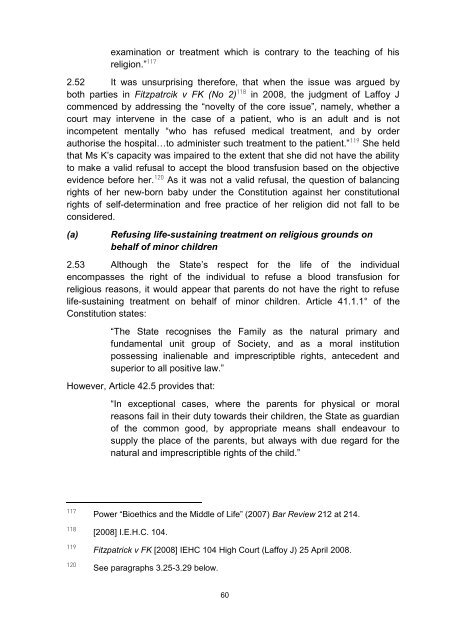Consultation Paper on Bioethics - Law Reform Commission
Consultation Paper on Bioethics - Law Reform Commission
Consultation Paper on Bioethics - Law Reform Commission
You also want an ePaper? Increase the reach of your titles
YUMPU automatically turns print PDFs into web optimized ePapers that Google loves.
examinati<strong>on</strong> or treatment which is c<strong>on</strong>trary to the teaching of his<br />
religi<strong>on</strong>.” 117<br />
2.52 It was unsurprising therefore, that when the issue was argued by<br />
both parties in Fitzpatrcik v FK (No 2) 118 in 2008, the judgment of Laffoy J<br />
commenced by addressing the “novelty of the core issue”, namely, whether a<br />
court may intervene in the case of a patient, who is an adult and is not<br />
incompetent mentally “who has refused medical treatment, and by order<br />
authorise the hospital…to administer such treatment to the patient.” 119 She held<br />
that Ms K‟s capacity was impaired to the extent that she did not have the ability<br />
to make a valid refusal to accept the blood transfusi<strong>on</strong> based <strong>on</strong> the objective<br />
evidence before her. 120 As it was not a valid refusal, the questi<strong>on</strong> of balancing<br />
rights of her new-born baby under the C<strong>on</strong>stituti<strong>on</strong> against her c<strong>on</strong>stituti<strong>on</strong>al<br />
rights of self-determinati<strong>on</strong> and free practice of her religi<strong>on</strong> did not fall to be<br />
c<strong>on</strong>sidered.<br />
(a) Refusing life-sustaining treatment <strong>on</strong> religious grounds <strong>on</strong><br />
behalf of minor children<br />
2.53 Although the State‟s respect for the life of the individual<br />
encompasses the right of the individual to refuse a blood transfusi<strong>on</strong> for<br />
religious reas<strong>on</strong>s, it would appear that parents do not have the right to refuse<br />
life-sustaining treatment <strong>on</strong> behalf of minor children. Article 41.1.1° of the<br />
C<strong>on</strong>stituti<strong>on</strong> states:<br />
“The State recognises the Family as the natural primary and<br />
fundamental unit group of Society, and as a moral instituti<strong>on</strong><br />
possessing inalienable and imprescriptible rights, antecedent and<br />
superior to all positive law.”<br />
However, Article 42.5 provides that:<br />
“In excepti<strong>on</strong>al cases, where the parents for physical or moral<br />
reas<strong>on</strong>s fail in their duty towards their children, the State as guardian<br />
of the comm<strong>on</strong> good, by appropriate means shall endeavour to<br />
supply the place of the parents, but always with due regard for the<br />
natural and imprescriptible rights of the child.”<br />
117 Power “<strong>Bioethics</strong> and the Middle of Life” (2007) Bar Review 212 at 214.<br />
118 [2008] I.E.H.C. 104.<br />
119 Fitzpatrick v FK [2008] IEHC 104 High Court (Laffoy J) 25 April 2008.<br />
120 See paragraphs 3.25-3.29 below.<br />
60

















